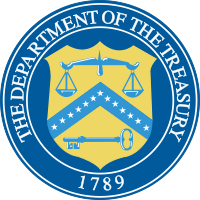Under Secretary of the Treasury for Terrorism and Financial Intelligence
The Under Secretary for Terrorism and Financial Intelligence is a position within the United States Department of the Treasury responsible for directing the Treasury's efforts to cut the lines of financial support for terrorists, fight financial crime, enforce economic sanctions against rogue nations, and combat the financial support of the proliferation of weapons of mass destruction. The Under Secretary is appointed by the President and confirmed by the Senate.
The current Acting Under Secretary is Adam Szubin. On April 16, 2015 he was nominated by President Barack Obama to permanently fill this position.[1] The Office of Terrorism and Financial Intelligence is one of sixteen agencies in the United States Intelligence Community. On February 9, 2015, former Under Secretary David S. Cohen became the Deputy Director of the Central Intelligence Agency.
Overview
The Under Secretary heads the Office of Terrorism and Financial Intelligence (TFI). Both were created when the administration of President Bush announced on May 8, 2004, that the Executive Office of Terrorist Financing and Financial Crimes (TFFC), the Financial Crimes Enforcement Network (FinCEN), the Office of Foreign Assets Control (OFAC), and allocated resources from the Treasury Department would be brought under the new office's control. The Under Secretary for Terrorism and Financial Intelligence also possesses oversight of the Office of Intelligence and Analysis (Treasury Department).[2] The Federal Reserve remains outside the jurisdiction of this office, and cannot be investigated by it..
History
The position's predecessor, the Under Secretary for Enforcement, managed law enforcement aspects of the Department prior to the reorganization. The Under Secretary for Enforcement provided oversight and policy guidance for the Bureau of Alcohol, Tobacco and Firearms, the U.S. Customs Service, the Federal Law Enforcement Training Center; the Financial Crimes Enforcement Network, the U.S. Secret Service, the Executive Office for Asset Forfeiture, and the Office of Foreign Assets Control. The Under Secretary also provided policy guidance over the Internal Revenue Service's Crime Investigation.[3][4]
Several of these agencies are now non-existent or have been moved into other federal departments. The Bureau of Alcohol, Tobacco, and Firearms was split into two separate bureaus, with one handling certain law enforcement aspects and the other handling tax collection aspects. The former was moved into the United States Department of Justice, while the latter was kept within the Department of the Treasury.[5] The U.S. Secret Service and the Federal Law Enforcement Training Center are now within the Department of Homeland Security.[6][7] The U.S. Customs Service was moved into the Department of Homeland Security when it became part of the U.S. Customs and Border Protection.[8] However, under the Homeland Security Act of 2002[9] Custom Service's "revenue functions" were retained by Treasury. This includes, among others, Customs duties, enforcing trade agreements, and counterfeit trademark detection and seizure.[10]
Former Under Secretaries
Former Under Secretaries of Enforcement include Jimmy Gurule,[3] James E. Johnson,[11] Raymond Kelly,[12] and Ronald Noble.[13]
See also
References
- ↑ "President Obama Announces More Key Administration Posts", White House, April 16, 2015
- ↑ "Bush Administration Announces Creation of New Office in Ramped up Effort to Fight the Financial War on Terror". Retrieved September 21, 2007.
- 1 2 "U.S. Treasury - Biography of Jimmy Gurule, Under Secretary for Enforcement". Archived from the original on October 3, 2007. Retrieved September 21, 2007.
- ↑ "U.S. Treasury - Duties & Functions of the Under Secretary of Enforcement". Archived from the original on February 13, 2006. Retrieved February 13, 2006.
- ↑ "About TTB:Home". Archived from the original on June 18, 2006. Retrieved June 18, 2006.
- ↑ "United States Secret Service: History". Archived from the original on October 4, 2007. Retrieved September 21, 2007.
- ↑ "Welcome to FLETC — Federal Law Enforcement Training Center". Retrieved September 21, 2007.
- ↑ "CBP.gov - home page". Retrieved September 21, 2007.
- ↑ Homeland Security Act of 2002 Homeland Security Act of 2002
- ↑ 6 U.S.C. § 215.
- ↑ "Nominations Sent to the Senate". Retrieved September 21, 2007.
- ↑ "12 in Ariz. militia unit arrested Paramilitary members accused of plotting to destroy federal offices". The Sun. July 2, 1996. Retrieved May 15, 2014.
- ↑ "Secretary General". Retrieved September 21, 2007.
